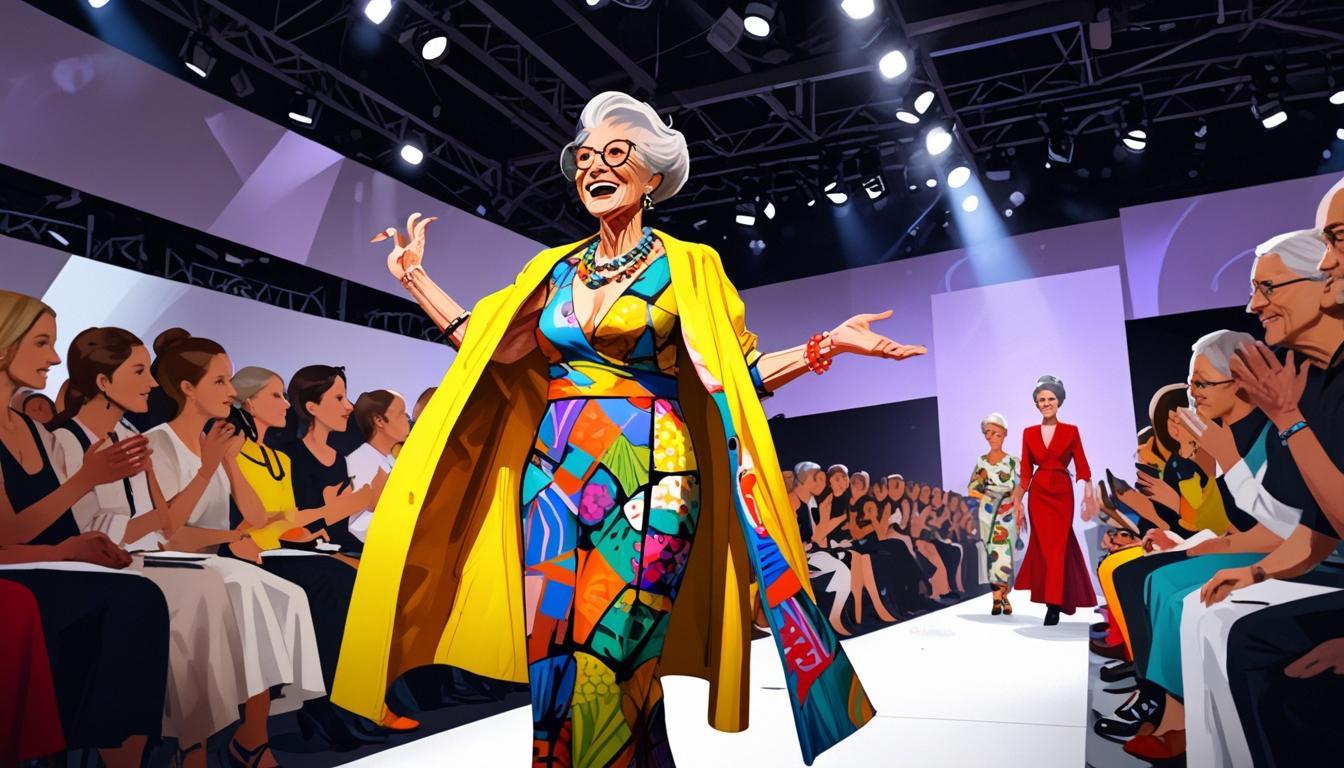The founding story of DKNY began with Donna Karan, who grew up in Queens, New York. Inspired by her father's tailoring skills and her early loss, she found her passion for fashion at the Parsons School of Design. In 1989, she launched DKNY to merge high-end design with practical everyday wear, especially influenced by her daughter's need for stylish clothing. The brand quickly gained fame with its "Seven Easy Pieces" collection, embodying New York City's spirit. Karan's vision promotes self-expression and inclusivity, leaving a lasting mark on the fashion world. Discover more about DKNY's journey and its cultural impact!
Donna Karan's Early Life

Donna Karan's journey into the world of fashion began long before she launched her iconic brand; it was shaped by her early life experiences. Growing up in Forest Hills, Queens, in a Jewish family, she was surrounded by creativity and craftsmanship. Her mother, a model, and her father, a tailor, laid the groundwork for Karan's passion for fashion. Tragically, she lost her father at just three years old, and this loss influenced her upbringing in Woodmere, Nassau County.
This blend of family heritage and early exposure to craftsmanship parallels the historical significance of brands like Ralph Lauren, where quality and tradition are highly valued, as seen in their vintage identification process.
As she navigated her teenage years, Karan discovered a love for sports and art, which helped her express herself creatively. After graduating from Hewlett High School in 1966, she took a significant step toward her dreams by attending Parsons School of Design. There, she honed her skills and immersed herself in the world of fashion. Her early interest was further fueled by her job at Sherries, a Long Island boutique, where she gained real-world experience.
During her formative years, Karan met designer Anne Klein, who became a significant mentor. Klein encouraged her to prioritize hands-on experience over traditional education, shaping her approach to the fashion industry.
This blend of a supportive family background, early exposure to fashion, and mentorship from industry leaders helped establish Karan's foundation as a designer. All these influences intertwined to ignite her passion for creating clothes that empower women, setting the stage for her future success in the fashion world.
Career Milestones and Achievements
With a solid foundation built from her early life experiences and mentorship, Karan commenced on a remarkable journey in the fashion industry. In 1989, she launched DKNY as a diffusion line, merging high-end fashion with everyday wear. Inspired by the lifestyle of her daughter, Gaby, Karan aimed to create versatile clothing that resonated with the energetic vibe of New York City.
This innovative approach quickly captured the hearts of a younger demographic, similar to how brands like Forever 21 evolved to attract youthful consumers through modernized branding and accessible styles vintage clothing insights.
The brand's popularity surged with the introduction of DKNY Jeans in 1991, which targeted a youthful audience and showcased urban aesthetics. This move solidified DKNY's place in casual wear, making it a go-to for those seeking stylish yet comfortable clothing.
That same year, Karan expanded the brand's offerings by introducing the first menswear collection, allowing DKNY to cater to modern male consumers who valued both fashion and functionality.
As DKNY flourished, it evolved into a global lifestyle brand, celebrating its 25th anniversary in Spring/Summer 2014. This milestone not only marked a significant achievement in Karan's career but also highlighted the enduring impact of the brand on the fashion industry.
Through her vision and dedication, Karan has managed to create a legacy that continues to inspire and influence, making DKNY a staple in both womenswear and menswear.
The Birth of DKNY

The inception of DKNY in 1989 marked a pivotal moment in fashion, blending high-end design with the practicality needed for everyday wear. Founded by Donna Karan, DKNY was inspired by her daughter Gaby's desire for stylish yet functional clothing. Donna saw a gap in the market for versatile clothing that reflected the urban lifestyle of New York City, where fast-paced living demanded practicality without sacrificing style.
Early success was linked to the iconic Seven Easy Pieces collection, which laid the groundwork for the brand's aesthetic and ethos, showcasing DKNY logo evolution.
From the beginning, DKNY focused on essentials like denim and sportswear, making these high-end fashion items accessible to a younger audience. The brand quickly gained recognition for its contemporary aesthetic, which combined luxury with everyday wearability. This approach not only appealed to fashion enthusiasts but also resonated with those seeking empowerment through their clothing choices.
Donna Karan believed that fashion should promote confidence and self-expression, and DKNY became a platform for women to embrace their individuality.
As DKNY evolved, it transformed into a global lifestyle label, branching out into various sub-brands and product categories that catered to diverse consumers. With each collection, DKNY highlighted the importance of versatile clothing that could shift seamlessly from day to night.
This commitment to practicality, while maintaining a chic look, solidified DKNY's place in the fashion world.
In just a few years, DKNY established itself as a staple in many wardrobes, proving that high-end fashion could indeed coexist with the demands of everyday life.
Brand Philosophy and Vision
Building on its foundation, DKNY's brand philosophy centers around empowering individuals through fashion. Founded in 1989 by Donna Karan, DKNY aims to blend luxury with accessibility, ensuring that stylish clothing is available to a wider audience. This commitment to empowerment promotes confidence and self-expression, allowing you to showcase your unique personality through versatile clothing that fits modern lifestyles.
Additionally, like tailoring a vintage graphic T-shirt, DKNY encourages individuals to make fashion choices that reflect personal style and narrative, emphasizing the importance of emotional connections to clothing how to tailor a vintage graphic T-shirt.
DKNY doesn't just focus on aesthetics; it emphasizes sustainability and ethical practices in its production methods. This approach reflects contemporary consumer values, ensuring that your fashion choices can align with your environmental responsibility.
The brand seeks innovative designs that resonate with the energetic spirit of New York City, capturing the vibrancy of urban life while remaining practical.
By breaking industry barriers, DKNY creates clothing that isn't only chic but also functional. This versatility appeals to diverse demographics, making it a brand that remains relevant across generations.
Whether you're dressing for a bustling day at work or a night out in the city, DKNY offers pieces that can adapt seamlessly between various settings.
In essence, DKNY's brand philosophy champions the idea that fashion should empower you, keeping you stylish without sacrificing your values. Embracing sustainability and innovative designs, DKNY proves that luxury can be accessible and responsible, giving you the freedom to express yourself in every aspect of your life.
Cultural Influence and Legacy

Fashion often reflects the cultural heartbeat of a city, and DKNY embodies the vibrant, diverse essence of New York City. Founded by Donna Karan in 1989, the brand merged high-end fashion with the everyday needs of urban life, catering to a wide array of consumers.
In a similar vein to how GAP emerged from youth culture, DKNY champions diversity and inclusivity, capturing the multicultural spirit of NYC and appealing to people across different ages and backgrounds.
One of DKNY's standout innovations is the "Seven Easy Pieces" concept, which revolutionized women's fashion by emphasizing versatility. This approach allows women to mix and match separates effortlessly, making style accessible and practical without sacrificing elegance.
As the urban lifestyle evolved, so did DKNY's commitment to sustainable practices that resonate with modern consumers. By integrating ethical production into their designs, the brand guarantees it stays relevant in today's ever-changing fashion landscape.
Moreover, DKNY has shaped global perceptions of American style, showcasing a unique blend of street fashion and high-end design. This connection to NYC's vibrant street culture goes beyond clothing; it engages with social issues, advocating for empowerment through fashion.
The brand not only celebrates the individuality of women but also inspires a sense of belonging in a diverse world.
In essence, DKNY's cultural influence and legacy are woven into the very fabric of New York City, reminding us that fashion isn't just about looking good—it's about embracing who we're and where we come from.





I genuinely treasure your piece of work, Great post.